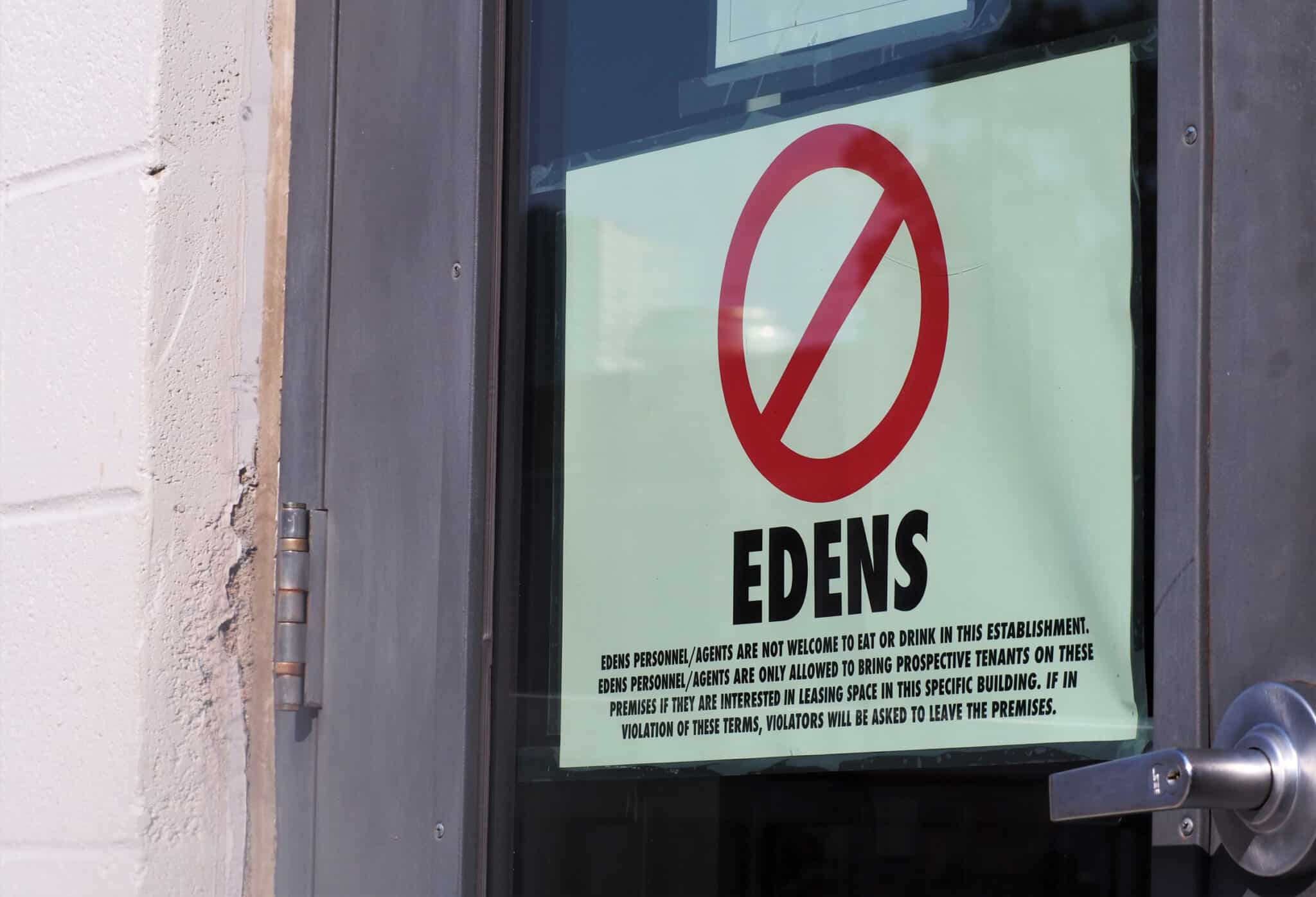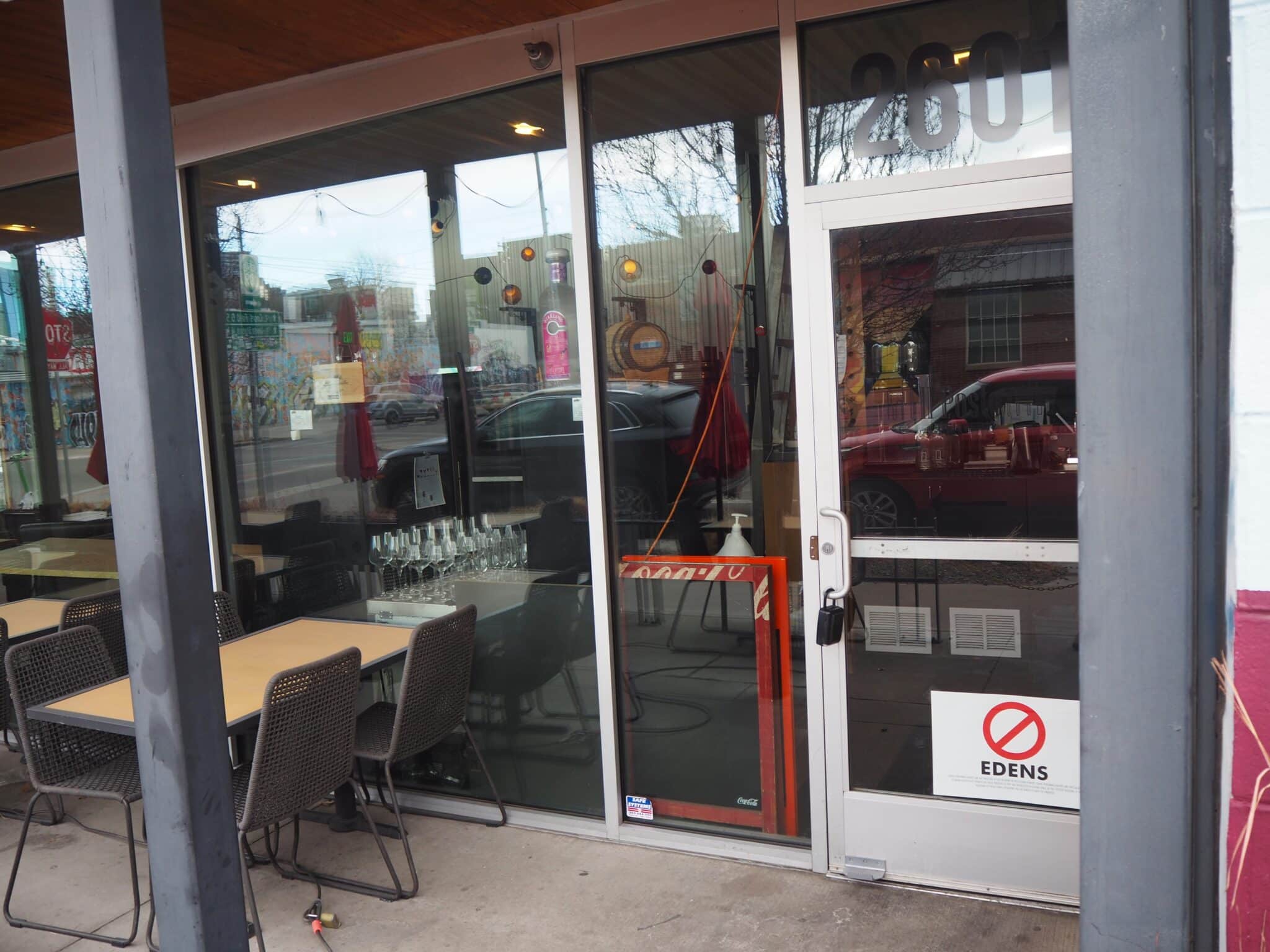
“Edens personnel/agents are not welcome to eat or drink,” the signs said. (BusinessDen file)
A public tenant-landlord feud in RiNo has ended.
Denver Central Market owner Ken Wolf told BusinessDen Monday that he has resolved disputes with his landlord Edens that focused on access to the building’s second floor and rooftop mechanical systems.
“They agreed to give us the access we wanted,” Wolf said.
The feud prompted Wolf to put up signs earlier this year on the door of the food hall, as well as the entrances to other nearby businesses Wolf co-owns like the restaurants Il Posto and Sushi-Rama. Those signs said Edens employees and representatives were “not welcome” in the establishments. It was the second time he’d put them up.
Wolf said he took the signs down last week.
Edens, a national real estate firm specializing in retail real estate, didn’t respond to a request for comment Monday.

A sign barring Edens staff in the window of Italian restaurant Il Posto on Tuesday, Feb. 28. (BusinessDen file)
Wolf said access to the rooftop systems is important in case of emergency issues with things like the building’s air conditioning, and that food hall employees need access to restrooms on the second floor.
He and Edens also previously disagreed over some common area maintenance, or CAM, charges. Wolf said the two parties “met midway” on that.
Wolf and Edens have more of a history than the typical tenant-landlord relationship. Wolf, an early force behind RiNo’s transformation, previously owned the buildings where his businesses operate. In 2018, entities he managed sold the real estate to Edens for more than $50 million, and he became, in his words, the company’s largest tenant locally.
After buying Wolf’s holdings, Edens has gone on to purchase other nearby real estate. A complex deal to secure the Volunteers of America block last year, which Edens plans to redevelop, brought the company’s total spent in the neighborhood to about $100 million. High-profile brands, including Patagonia and Burton, are among those that rent RiNo space from Edens.

“Edens personnel/agents are not welcome to eat or drink,” the signs said. (BusinessDen file)
A public tenant-landlord feud in RiNo has ended.
Denver Central Market owner Ken Wolf told BusinessDen Monday that he has resolved disputes with his landlord Edens that focused on access to the building’s second floor and rooftop mechanical systems.
“They agreed to give us the access we wanted,” Wolf said.
The feud prompted Wolf to put up signs earlier this year on the door of the food hall, as well as the entrances to other nearby businesses Wolf co-owns like the restaurants Il Posto and Sushi-Rama. Those signs said Edens employees and representatives were “not welcome” in the establishments. It was the second time he’d put them up.
Wolf said he took the signs down last week.
Edens, a national real estate firm specializing in retail real estate, didn’t respond to a request for comment Monday.

A sign barring Edens staff in the window of Italian restaurant Il Posto on Tuesday, Feb. 28. (BusinessDen file)
Wolf said access to the rooftop systems is important in case of emergency issues with things like the building’s air conditioning, and that food hall employees need access to restrooms on the second floor.
He and Edens also previously disagreed over some common area maintenance, or CAM, charges. Wolf said the two parties “met midway” on that.
Wolf and Edens have more of a history than the typical tenant-landlord relationship. Wolf, an early force behind RiNo’s transformation, previously owned the buildings where his businesses operate. In 2018, entities he managed sold the real estate to Edens for more than $50 million, and he became, in his words, the company’s largest tenant locally.
After buying Wolf’s holdings, Edens has gone on to purchase other nearby real estate. A complex deal to secure the Volunteers of America block last year, which Edens plans to redevelop, brought the company’s total spent in the neighborhood to about $100 million. High-profile brands, including Patagonia and Burton, are among those that rent RiNo space from Edens.
